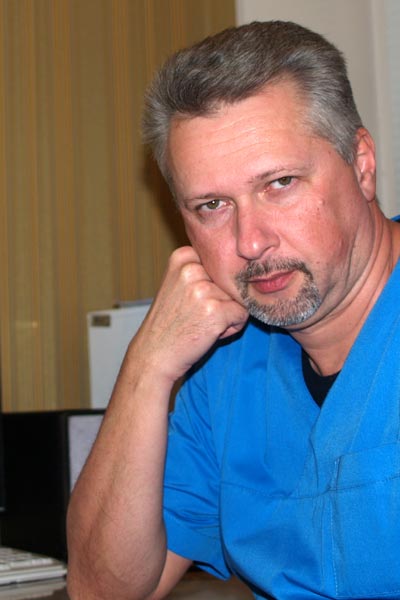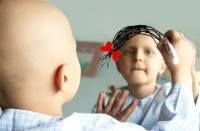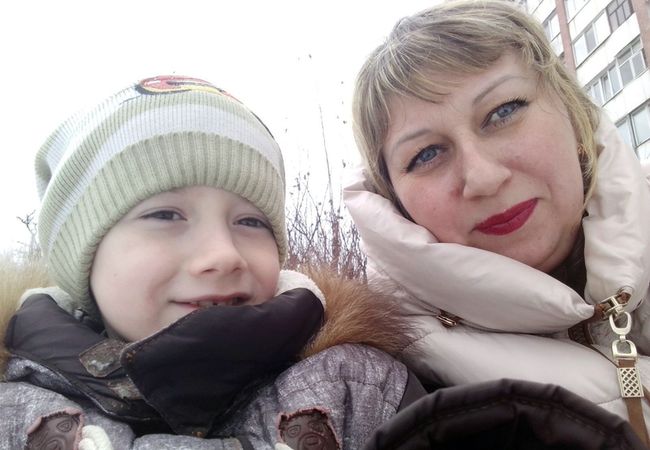
As a child I wanted to be a doctor, as many of other kids did. Only I couldn't make up my mind what kind of doctor to become... And then at the age of 14 an illness brought me to the children's resuscitation department, where I understood, what kind of doctor I DO NOT want to be — children's resuscitator. I thought that only cruel and heartless people could do all those stressing and painful manipulations to kids!
Many years have passed... Now I associate and work with those doctors at the children's resuscitation department who saved my life back then. And I know no other branch of medicine where so many sympathetic and tender-hearted people work. When I was asked to name one department of our children's hospital where doctors do miracles on daily basis, I said without hesitation “resuscitation department”. That's why today's article from our column “I Just Work as a Magician” is an interview with the chief of the Regional Zaporizhya Children's Hospital resuscitation department Andrey Aleksandrovich Chalov.
- Andrey Aleksandrovich, my first question is quite worn — what prompted you to become a doctor?
- The way my parents brought me up. My father was a front-line soldier throughout the whole Great Patriotic War. He served in the 133rd Sevastopol guard cannon fighter-antitank regiment. When I was a little boy, my father used to bring me to Sevastopol to the Sapun-mountain, where at the diorama entrance there are steles with the carved names of the units that took part in the defense of Sevastopol and the assault on the Sapun-mountain. Dad's regiment's name is there too — that's why I remember it so well... My father educated me according to the examples from his youth. And his youth went this way: graduation from school on the 19th of June, 1941, and three days later - mobilization, Rostov artillery academy, and then — war... After the war my father worked in metallurgy...
My mother was a chemistry teacher, she was given the title of the best chemistry teacher of the city in the 1970s. It's funny, I sometimes meet colleagues whom my mother taught chemistry. Even one of the doctors in our department is her former student.
As I was saying, my parents taught me that the most important thing in this life is to be helpful, to do something useful for people. And medicine... it probably happens to be the one branch where this “usefulness” is the most obvious. Besides, the notorious military order is needed here more than anywhere else. Medical help is effective only when there are distinct subordination, accurately scheduled operational procedures, clear organisation etc. To me this is plain and familiar. That is why I ended up as a doctor.
- Why did you choose such complex branch as children's resuscitation? Also because of the similarity with the military actions?
- Partly for that reason, but not only for that... At first I took interest in pediatrics. Working with children gives you a special feeling. The responsibility is more intense, but the reward is much bigger than when dealing with adults. I turned towards resuscitation by my fourth year in college. Because resuscitation is a branch of medicine where the results of doctor's work are more obvious than anywhere. When they bring you a person who is hardly breathing, and whose heart is hardly beating at all... And you have only a couple of minutes to figure out what's wrong with him and to help. And then you look at him — and he is blushing and smiling to you... or not smiling, but crying and calling his mom — it doesn't matter. What matters is that he's alive. In no other branch of medicine you can see the result of your work so quickly and so clearly.

- In all these years of working in resuscitation, hasn't it disappointed you?
- The profession? No! The system — yes! It is terrible that I have to ask charity foundations for life-saving equipment for my patients. It is terrible that in order to reduce costs we have to break the rules that form the basis of our patients' safety. And it is all the more terrible that I have to give the children's parents the lists of drugs and supplies that would cost hundreds of hrivnas a day.
- What is the hardest thing for you in your job?
- Probably it is punishing subordinates... Being the chief of the department is harder for me than being just a doctor. Because medicine, and especially resuscitation, is the field that does not forgive mistakes. At the same time, doctors are men, and men are liable to make mistakes. And my part as the chief's is to keep the number of these mistakes to a minimum, draw conclusions and prevent my doctors from repeating these mistakes. Besides... there is a saying in the army: if a soldier didn't carry out an order, it's not his fault, it's the fault of his captain. This means he could not make it clear to his subordinate, couldn't motivate the soldier or even didn't provide the means to fulfill the command. This rule also applies to my profession. If my subordinate makes a mistake, it is my fault: I haven't taught him well, I haven't backstopped him, haven't provided the work conditions etc. This is hard...
- Harder than failing yourself? When, for example, you fail to save a child?
- Probably so. We are not gods, you know. And we do not and cannot have a 100% survival rate. There are situations when we do all we can possibly do, but the patient dies anyway. Sometimes at once, several minutes or hours later after he is admitted. Sometimes after weeks or even months of nursing him the result is the same... But if in such moments you know that you did everything you could possibly do, there is no such bitterness.
- Do you sometimes want to leave this job?
- Of course!
- What stops you?
- The prospect of a new working day. Sometimes on Fridays after lunch I feel exhausted and overweary. I want to leave the hospital and never come back. But then on Sunday evening I catch myself thinking about my work, I can't help feeling almost physically drawn there. Because no matter how hard this job is, there is no other job where I could feel these emotions, this pleasure from doing something well. I do not say “from saving someone”, just “doing your job well”. Sometimes you do all possible things, but still cannot save the patient... and the child's relatives still thank you... They thank for fighting for the child's life... that means a lot.
- What is the most pleasant thing about this job?
- It is a pleasure to walk the child out of the resuscitation room door, to give him to his parents, alive and well. It is a pleasure to meet my patients somewhere outside the hospital walls. Sometimes after many years. To see, to remember in what state a child was and how we pulled him through, to feel glad. For him, for his relatives, and for myself...
- You probably wish there were more such moments, such meetings?
- Of course I do! They really happen very seldom... Once a child is sent home from resuscitation, he and his relatives all want to forget about the whole thing as if it were a bad dream. To forget what happened, and our department, and us — doctors — as well... I can understand them... But these things make me happy — these rare meetings, these chances to see the fruit of my labor after many years...
- Speaking of happiness... What is happiness, in your opinion?
- That is one difficult philosophical question. Probably happiness is in the feeling of security. For myself, for my family, for my patients. When there's no need to wake up in the morning and worry about the future of my children, about the availability of drugs and supplies for my patients. As for not worrying — you know the saying “once you pay the taxes, you can sleep without worry”. Well, in this case you can live without worrying when you know you've done your job well, spent time with your family, helped your parents, met your friends... when you know you've filled your life with important and wholesome things. But one can never fill this vessel up to the brim... A normal human being cannot have absolute happiness. Only an idiot (a simpleton — translation from Latin) can be perfectly happy. You know how this rhyme goes:
My horizon is bright and clear,
It is full of joyous pictures.
It's not because the world is wonderful
but because I am a cretin.
- After such poem I am not sure whether to ask you if you consider yourself a happy man?
- Of course I do! Because all my life I've been doing things I wanted and liked to do. Because I have those who are dear to me. And I have friends. Of course, I would be happier about my job if not only I was glad to do it every day, but if the officials were also glad about this fact and provided me with the necessities.
- And what is the happiest day of your life?
- It's the day my youngest daughter was born! It was 20 years ago. Maybe this memory is so bright because she was born not long after my mother died, it was like she came to us instead of her... And she looks just like my mother, resembles her in appearance, character, mimics, everything!
- You spend a lot of time at work. What else do you like doing?
- I have a hobby... I picked it up from my uncle, who, like my father, served as a soldier throughout the whole Great Patriotic War, but as a fighter-pilot. It is historical aeromodeling. It is very diligent work, but it helps you relax and forget about the everyday routine.
- What are you dreams?
- I dream of my own children living happily and safely. I dream of traveling around the world, seeing other countries and peoples, starting with those with the most ancient history: China, Korea, Japan, Greece, Israel, Mesopotamia, Ethiopia... Especially Ethiopia, because the first “proto-human” was found there, and there, according to legends, many Christian relics were buried. I want to see the south of Africa, Chile, Peru, Argentina. I want to visit unusual places, places unlike those I've lived my whole life in. However, Antarctica does not attract me at all — it's too cold there... I don't like cold... I've been to Siberia, you know...
- How did you end up there?
- Student construction brigade. We were building petrol and gas pipelines. It was a very interesting experience — with all the students from all parts of the USSR around I had a chance to meet and get to know all kinds of people. And I still have a third degree woodman-concreter diploma as a memento, and the skills in construction work. Very useful skills, too. There were times when builders would come to our department to do the maintenance, and I would have to teach them how to handle a float.
- Do you believe that the world can be changed for the better?
- Yes! However strange it is — I do! And, however strange, I hope that the world will be changing for the better. Of course, the goal of changing the whole world is an enormous one. But it is realistic enough to change a piece of this world around you. And whether this will be done or not — it depends only on us. The scheme for fighting the ruin was clearly stated by professor Preobrazhenskiy in “The Heard of a Dog” by M.Bulgakov. In order to improve the world, one has to start with himself and what's around him. And if there are enough of those improving the world this way, sooner or later it will be transformed.
- Do you believe in miracles?
- Yes, but only in well-organized miracles! Miracles only happen where the way is already paved for them. In our job everything has to be organized, well-adjusted and smoothly functioning. And if it is — we won't need any miracles... or we will need just a little of them. If a doctor needs a divine miracle, he is a poor doctor.
- What is for you the meaning of life?
- I've never thought about it... Probably it's just living your life and not getting in the way of others living theirs. And what's even better — helping others to live.
I was talking to Andrey Aleksandrovich and I remembered how I first saw him almost 13 years ago. The days of his attendance at the children's resuscitation department were not as boring as the other days. I remembered that one time when he brought me, his patient, a cosmetics catalog and said “Ira, instead of just lying here idle and bored, why don't you help me pick a lipstick for my wife?” Somehow I'm not sure his wife liked what I had picked )))... But I clearly remember thinking that resuscitators, really, were people, too :) And now, 13 years later, saying good-bye to Andrey Aleksandrovich, I thought that resuscitators aren't just people... they are interesting people of great depths... who sometimes do miracles!



